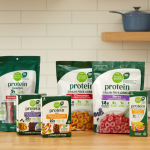‘Regenerative Agriculture Is Not A New Catchphrase’: Five Questions With Singing Pastures Farm Co-Founders John And Holly Arbuckle
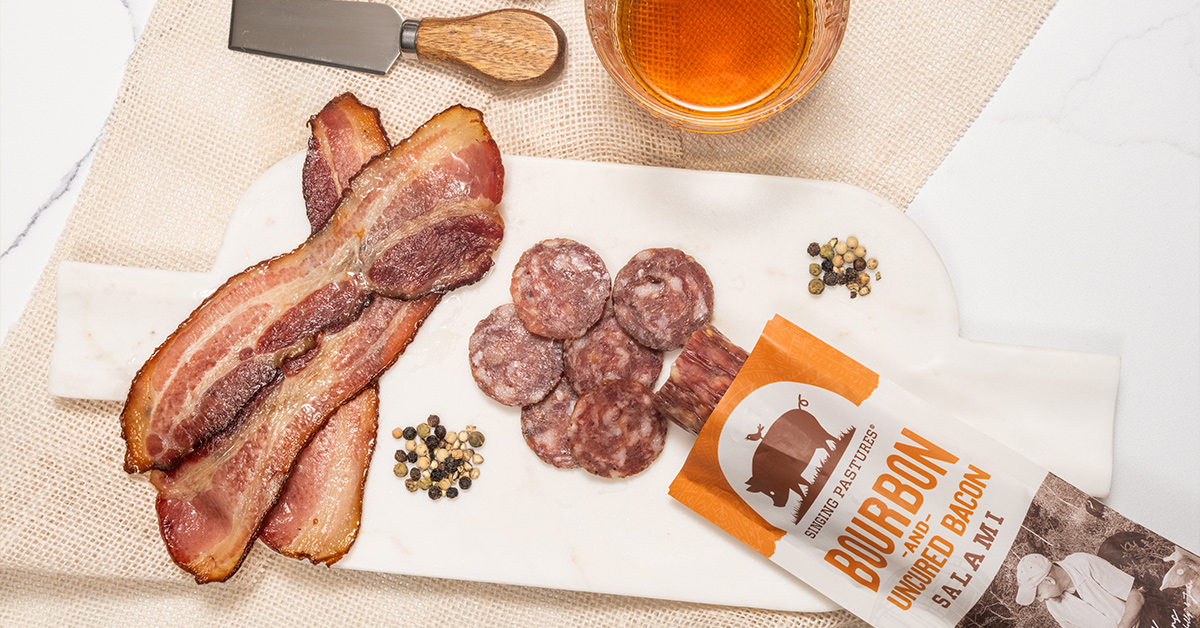
As categories like jerky and meat sticks have matured, brands like Chomps and Country Archer have evolved the quality of offerings with grass-fed and pasture-raised options. Looking to ride that momentum even further, Singing Pastures Farm is making its case for regeneratively-farmed meat snacks in part by arguing that raising pigs can be just as good for the environment as some of their bovine and avian neighbors.
“We don’t just support regenerative agriculture, we live it,” said Holly Arbuckle, speaking from the small coastal village of Newcastle, Maine where she has run Singing Pastures Farm with her husband John since relocating from Missouri in 2018. The brand markets a three-SKU line of Roam meat sticks (Uncured Bacon, Pineapple and Jalapeño) and two varieties of salami in stores like Thrive Market, Misfits Market and Imperfect Foods, as well as DTC .
The Arbuckles spoke with Nosh recently about refreshing Singing Pastures’ branding, how the company is attempting to tell the story of regenerative farming to a broader base of consumers and bringing awareness to the benefits of eating pasture-raised pork as it drives toward more distribution in larger natural retail chains.
What is the sourcing and production model for Singing Pastures and Roam Sticks meat snacks?
We source from our farm and other pasture-based, family farms. That is our baseline. Some of the farms we work with are going for third-party verification like Regenerative Organic Certified. Our home farm has started this process with Land to Market’s Ecological Outcome Verification testing. We think third party verification is going to become very important for brands, and we are especially drawn to verifications that are based on soil health outcomes. We plan to start with one SKU to have a “regenerative” third- party verification because that is what seems doable and reasonable in the next year.
One issue is that the cost of the verification is always put on the farmer or rancher. This is tricky because less than 5% of the public even knows what these regenerative seals mean. The risk is (once again) put on the farmer, without a guarantee of creating a ROI in commanding a higher price point. As both a farm and a brand, we struggle with this and believe there should be more support for farmers and ranchers to move towards regenerative, rather than just exporting more risk onto the supply chains.
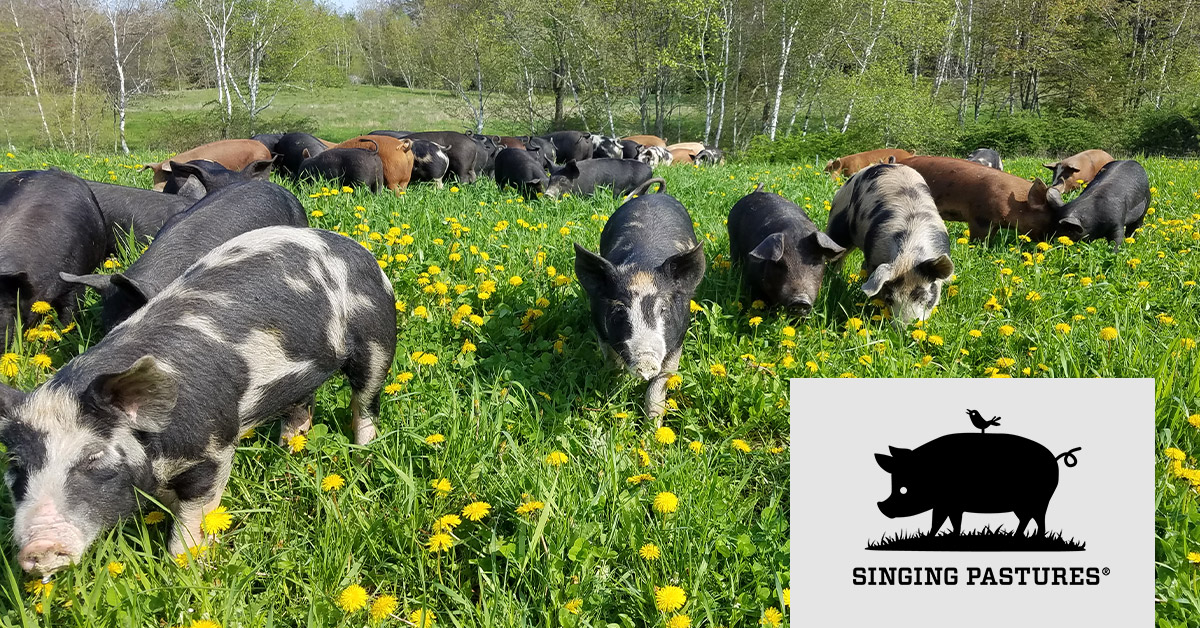
How have you positioned the brand to try and reshape vAmerican consumers’ view of pig farming and the role pigs play in environmentally progressive agriculture?
Our farm and the farms we work with are antibiotic-free, their grain is either non-GMO or organic, and they are raised on pasture while provided with shelter from the environment. Our unofficial farm motto is that the pigs have a happy, summer camp-like life, and one bad day. Our experience is that most people understand that in order to eat, something has to die, even if you are vegetarian. For many people, what is important is knowing that the meat was produced in a way that is good for the land, the animals and human health. It is a privilege to be part of the better farming movement.
How do you build a scalable brand while telling the story of being a farmer-led company that uses rotational grazing and regenerative farming techniques?
The opportunity in starting a brand is to get out in front of people who may have never thought about how their food is produced. There is a much greater chance for impact when you are selling across the country and there is a real need for medium-scale supply chains that are able to offer better food through better farming. Our farm is part of the fabric of our lives, and we recognize that the regenerative movement is going to take more than individuals.
There are many brands that see regenerative agriculture as the latest marketing trend and want to be a part of it. We came to pasture-based and regenerative agriculture from a different perspective. It isn’t a new catchphrase; it is personal.
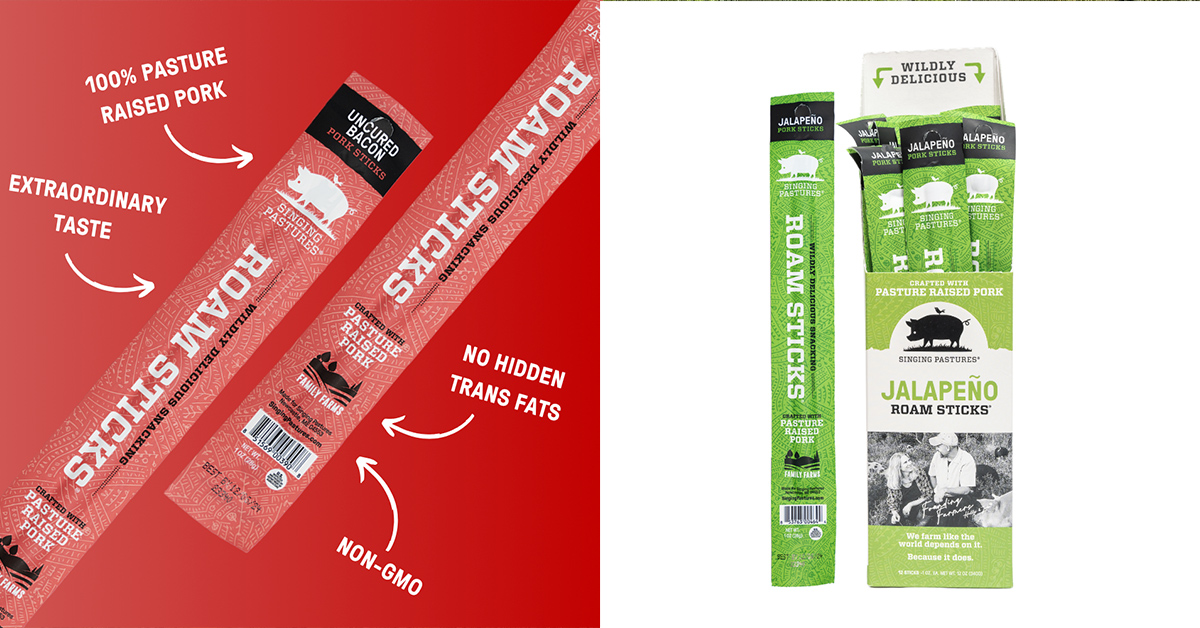
What’s the value proposition that Singing Pastures Farm makes to new customers?
Simply put, better farming creates more delicious, nutrient-dense food. This is the doorway for most people into regenerative agriculture. There are other fabulous reasons to support regenerative agriculture like helping to restore healthy water cycles, preventing erosion, sequestering carbon and revitalizing rural economies. It almost doesn’t matter what a person’s point of entry is because the co-benefits are so incredible. When consumers are presented with the idea of healthy soil as the foundation for food we eat, it makes sense on a gut level and is a wellspring of hope. Grocery stores are one of the fastest ways to reach consumers when they are literally in the act of making decisions about what they will buy and what they bring home to their families.
Are there ways that the brand differentiates its products to consumers?
We are one of the only national brands offering pasture-raised pork. Roam Sticks focus on taste. Our sticks are fermented and then smoked with real hickory wood for 16 hours which is a lot slower than other more industrial methods, but the texture of the sticks is tender and juicy, rather than dry and chewy. The fermentation and slow-smoking process we use is also healthier.
A lot of big brands use encapsulated acids. The problem with “encapsulation” is the hydrogenated vegetable oil (a trans fat) which is one of the most metabolically toxic ingredients in processed foods. Foods containing 0.5 grams of trans fats in one serving size can still claim “zero trans fats” on the label. We decided we couldn’t feel good about trans fats in the sticks because we value transparency and health.



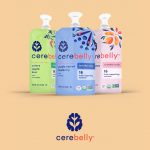




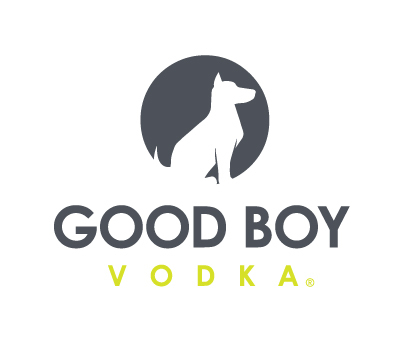






![[Updated] Oats Overnights Secures $45M Investment From Astō](https://d2azl42aua8mom.cloudfront.net/wp-content/uploads/2026/01/29172259/2026-01-29-oats-overnights-secures-45m-in-growth-equity-from-square-150x150.jpg)
